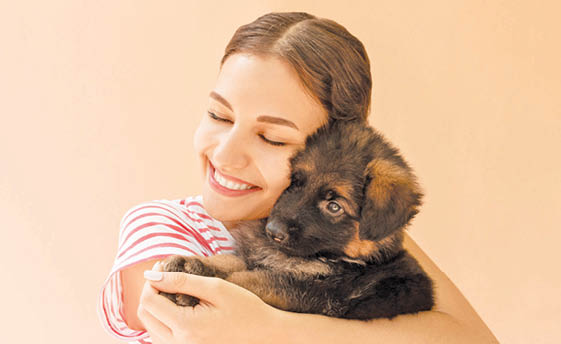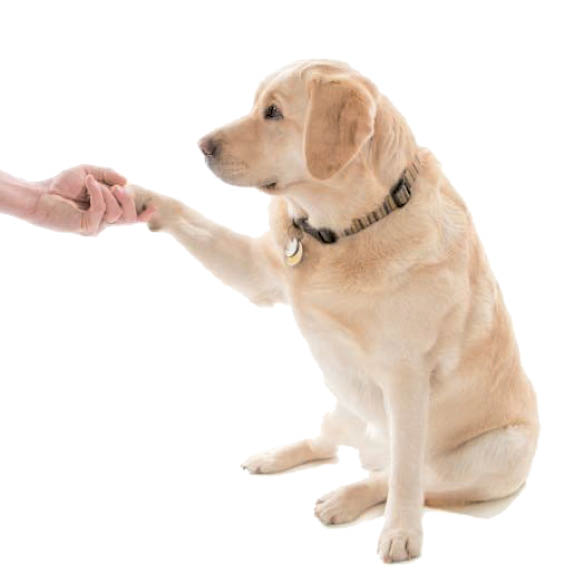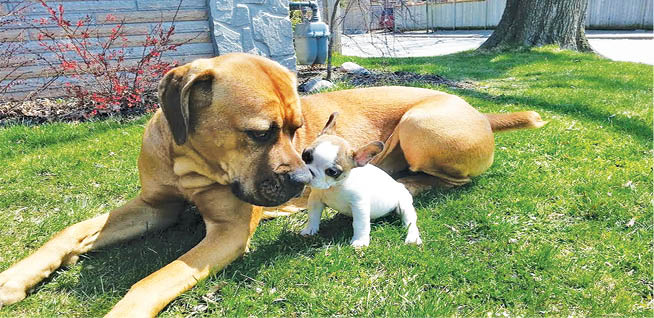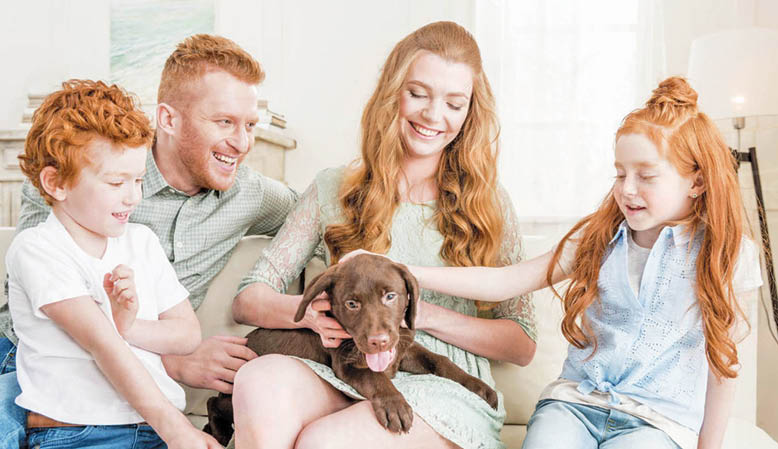
Shirin Merchant is India’s pioneering Canine Behaviourist and Trainer. For the past 25 years, she has worked hard to ensure that dogs in India are trained using reward-based methods.
Socialising your pup at the correct age can help it to grow into a happy, confident, adult dog.
Romila thought she was the perfect puppy owner. She had brought up her six-month-old Golden Retriever – Tango, with plenty of love, discipline and protected him from all harm. As per the vet’s suggestion, she fed him the perfect diet, kept him isolated till his inoculations were complete and made sure he didn’t interact with large dogs, in case one of them bit him.
It came as a surprise to her then when she took Tango for a walk to a park one day and he barked at the kids playing. When she forced him to interact, he bared his teeth at a little girl! Tango was a relatively friendly dog at home, she complained – then why did he behave in this uncertain manner? Wasn’t a Goldie supposed to be friendly around all humans? What was wrong with the puppy then? On consulting a canine behaviour counsellor, Romila was astonished to learn that her ‘perfect upbringing’ had a few flaws. One of her mistakes was to isolate the puppy at the critical stage of socialisation. All puppies go through a crucial phase of learning, roughly between five weeks to four months. At this age, the dog’s mind is primed to learn to accept new experiences. Dogs that miss out on this crucial learning stage can often end up as fearful dogs that are afraid of new people, experiences or even places.
Interestingly, the mother starts off the socialisation process by rejecting her puppies as they grow older. This forces them to interact with others and make friends. A mother that is too protective and constantly panders to the puppy’s demands, risks making her pups dependent on her – thus causing them immeasurable harm in the long run. Puppies that are raised in isolation, such as in a garage, an isolated dog kennel, or even an empty room, have little exposure to humans or other dogs and often end up with behavioural problems. When the puppy arrives at your home, it is imperative for you to continue the process the mother commenced.
Socialising a puppy involves teaching it how to behave in a socially acceptable manner with other people and animals. Many pet owners and trainers mistakenly believe that by taking a dog to place where there are dogs or people will help socialise the pup. In truth, good social skills need to be taught – a pup must learn to enjoy the company of people, other dogs and being comfortable in different places and situations.
Unfortunately, the socialisation period coincides with the inoculation period; most vets will insist you barricade your puppy at home and forbid it from meeting strangers and other dogs – their reasons centre on the vaccination status and the potential for the puppy acquiring a fatal disease. While we must be very careful with our pups at this time, it is also important to note that research done in USA shelters reveal that more puppies are destroyed before their second birthday due to behaviour problems stemming from a lack of socialisation at the correct age, than those that die of vaccination-related diseases. This has led most vets to agree to the importance of careful socialisation of a young pup. Remember, the onus of teaching a puppy how to behave and accept new people and situations lies on the owner. A good owner will ensure he does as much as possible to ensure that his puppy grows into a friendly and confident dog.
 SOCIALISING YOUR PUPPY
SOCIALISING YOUR PUPPY
There is no hard and fast rule to socialising your puppy. Keep in mind that you want to expose it to as many different places, environments, people and animals but all in a controlled manner under pleasant circumstances and with positive consequences. Take each step slowly and if at all you notice your puppy getting nervous or unhappy, it is best to remove it from the situation rather than forcing it to face its fears – that’s not what good socialisation is about. The tips below can be used as a general guide to help your puppy grow into a happy, confident adult:
Home Care: The day you bring your puppy home, its socialisation process can begin – meeting the family, the ride home in the car, the trip to the vet… are all experiences that need to be handled carefully. Go at a pace that your puppy is comfortable with and don’t expose it to too much, too fast. If you notice the puppy getting stressed – some sure signs are excessive yawning, panting or lip licking – allow your pup to get some rest in a quiet spot where it will not be disturbed by inquisitive neighbours or relatives. Over a period of weeks, expose your pup to objects around the house (especially noisy home appliances) – the vacuum cleaner, the mixer, fans, hair dryers, mirrors, etc. It is also a good idea to call over your friends, neighbours and relatives and get them to interact with your pup in a positive manner – give the pup a treat for obeying a command or play a game of fetch. This goes a long way in teaching the pup that visitors are fun and often come bearing gifts.
Meeting People: Puppies that haven’t been exposed in a positive manner to a wide variety of people – different ages, ethnic communities and colours can grow up being suspicious of particular people. Make sure your pup gets to meet and has pleasant experiences with as many different people as possible, for example, men in beards, women in flowing saris, children, screaming toddlers, a person in a wheelchair or walking with the aid of crutches, garrulous teens, etc. If you can take your pup to friends’ homes and let your friends reward your pup with treats and praise for good behaviour, it will learn that people are not to be feared and can be great fun to be around. Good socialising is as much about exposure as it is about good manners so make sure your pup exhibits good manners when interacting with people – no jumping up or barking at strangers should be allowed. A badly behaved dog is an unwelcome nuisance. It is important to get your pup to interact with service people – the postman, garbage collector, bread man, etc., too. We often make the mistake of omitting this vital group of people from the puppy’s socialisation programme only to end up with an adult dog that barks suspiciously when a person delivers a parcel!
Going Places: In the first few weeks of your puppy’s life, take it to as many different places as possible – a children’s park, a teen sleepover party, a fish bazaar, a crowded streets, a football game, a festive fair, a mall, a beach, camping… be as creative as you can. Let your pup take in the sights, sounds and smells in a new place and wait till he’s relaxed and comfortable in that environment before rewarding him with treats, praise or even a game with a toy. If he spooks at something, you may choose to wait in that place for a while or remove the puppy to a safer, quieter spot and reintroduce him to it later, depending on the level of fear he exhibits. Allow strangers to meet him so that he gets plenty of pleasant experiences. Approach the process gradually, so as not to overwhelm your puppy – for example, do not take a pup bred in a quiet country-side home and place it on a side walk in a big city. Instead, carry it to a park and allow it to take in the new sights and sounds gradually.
 Meeting Dogs: Dog owners feel that their dogs and puppies needs to play with its own species or is missing out on canine interaction. Allowing your dog to play rough or rowdy games with another dog can actually contribute towards making it an aggressive dog. If you know calm, friendly adult dogs which are up-to–date on their vaccination shots, allow your pup to interact with them under close supervision. Do not allow your pup to play rough, nip, irritate the older dog or basically do anything to the adult in play that will get him into trouble if he tries it with other dogs when he gets older. It is your role to teach him acceptable and unacceptable behaviour. A sensible, mature dog will have a great influence on your pup’s developing play behaviour around other dogs as well.
Meeting Dogs: Dog owners feel that their dogs and puppies needs to play with its own species or is missing out on canine interaction. Allowing your dog to play rough or rowdy games with another dog can actually contribute towards making it an aggressive dog. If you know calm, friendly adult dogs which are up-to–date on their vaccination shots, allow your pup to interact with them under close supervision. Do not allow your pup to play rough, nip, irritate the older dog or basically do anything to the adult in play that will get him into trouble if he tries it with other dogs when he gets older. It is your role to teach him acceptable and unacceptable behaviour. A sensible, mature dog will have a great influence on your pup’s developing play behaviour around other dogs as well.
Socialising a dog may sound like a lot of hard work, but it really is about having fun with your dog and encouraging him to view the world as a wonderful place. Investing a bit of time and effort into your puppy when it is young, will reap rewards when the dog is older. A well socialised dog is fun to be around, welcome everywhere and is a happy confident dog that will make the most of life!
- The Dark Side Of Pampered Pets: Is Your Kindness Harming Your Dog? - 16 March2024
- Kids And Preventing Dog Bites - 18 March2023
- Ordinary Dogs With Extraordinary Jobs - 13 August2022
